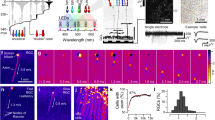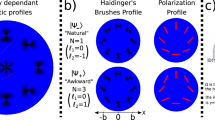Abstract
POLARIZED light perception has never been unequivocally proven in vertebrates except man. An unusually alert human observer can see by inspection the plane of polarization (e-vector) in linearly polarized light by virtue of Haidinger's brushes, a faint blue and yellow image of intraocular origin produced by the selective absorption of polarized light by the yellow macular pigment of the fovea. Attempts to demonstrate polarized light perception in other vertebrates have, however, usually failed (for example in birds1,2).
This is a preview of subscription content, access via your institution
Access options
Subscribe to this journal
Receive 51 print issues and online access
$199.00 per year
only $3.90 per issue
Buy this article
- Purchase on Springer Link
- Instant access to full article PDF
Prices may be subject to local taxes which are calculated during checkout
Similar content being viewed by others
References
Kramer, G., Naturwissenschaften, 37, 377 (1950).
Montgomery, K. C., and Heinemann, E. G., Science, 116, 454 (1952).
Waterman, T. H., Proc. Fifteenth Intern. Cong. Zool. Lond., 537 (1959).
Dill, P. A., thesis, Univ. British Columbia (1965).
Groot, C., Behaviour, Suppl. 14 (Brill, Leiden, 1965).
Waterman, T. H., Science, 120, 927 (1954).
Batschelet, E., Statistical Methods for the Analysis of Problems in Animal Orientation (American Institute of Biological Sciences, Washington, 1965).
Waterman, T. H., and Westell, W. E., J. Mar. Res., 15, 149 (1956).
Waterman, T. H., Amer. Sci., 54, 15 (1966).
Ivanoff, A., and Waterman, T. H., J. Mar. Res., 16, 255 (1958).
Waterman, T. H., in Perspectives in Marine Biology (edit. by Buzatti-Traverso, A. A.), 429 (University of California Press, Berkeley, 1958).
Waterman, T. H., in The Functional Organization of the Compound Eye (edit. by Bernhard, C. G.), 493 (Pergamon Press, Oxford, 1966).
Eguchi, E., and Waterman, T. H., Z. Zellforsch., 84, 87 (1968).
Hays, D., and Goldsmith, T. H., Z. Vergl. Physiol., 65, 218 (1969).
Shaw, S. R., Vision Res., 9(9), 999, (1969); 9(9), 1031 (1969).
Waterman, T. H., Fernandez, H. R., and Goldsmith, T. H., J. Gen. Physiol., 54, 415 (1969).
Waterman, T. H., and Fernandez, H. R., Z. Vergl. Physiol., 68, 154 (1970).
Walls, G. L., The Vertebrate Eye and its Adaptive Radiation (Hafner, New York and London, reprint 1963).
Marks, W. B., J. Physiol., 178, 14 (1965).
Engstrom, K., Acta Zool., 44, 1 (1963).
Eguchi, E., and Waterman, T. H., in The Functional Organization of the Compound Eye (edit. by Bernhard, C. G.), 105 (Pergamon Press, Oxford, 1966).
Author information
Authors and Affiliations
Rights and permissions
About this article
Cite this article
WATERMAN, T., FORWARD, R. Field Evidence for Polarized Light Sensitivity in the Fish Zenarchopterus. Nature 228, 85–87 (1970). https://doi.org/10.1038/228085a0
Received:
Revised:
Issue Date:
DOI: https://doi.org/10.1038/228085a0
This article is cited by
-
Eavesdropping on visual secrets
Evolutionary Ecology (2013)
-
Double cones as a basis for a new type of polarization vision in vertebrates
Nature (1991)
-
Cone photoreceptor mechanisms and the detection of polarized light in fish
Journal of Comparative Physiology A (1987)
-
E-vector discrimination by the goldfish optic tectum
Journal of Comparative Physiology ? A (1974)
Comments
By submitting a comment you agree to abide by our Terms and Community Guidelines. If you find something abusive or that does not comply with our terms or guidelines please flag it as inappropriate.



